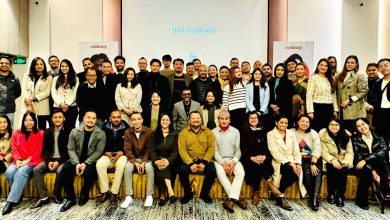It’s not everyday I get invited to a brawl.
Suntukan Sa Ace Hardware (“Brawl at Ace Hardware”) is the same serendipitous silliness that leads to mosh pits, where strangers unite around a strange act and derive quite a fair amount of happiness from it. Filipinos on Facebook have certainly been enjoying it these past couple of days. (FHM did a primer.)
But Ace Hardware is having none of this silliness. This was its polite, gently scolding response:

I visited the event page and didn’t stay. There was a lot of NSFW venting and crude humor in it. But — and this is important for the marketer to consider — there was no outright negativity towards the Ace Hardware brand itself.
By now, the original Suntukan sa Ace Hardware event has been taken down, much to the intense (albeit brief) dismay of people who will soon be moving on to the next ad hoc melee.
I’m dismayed for a different reason. I see something that could have transformed a marketer’s career and won an Effie.
“Disclaimer” is not an effective social strategy. “Business as usual” doesn’t bring in extra eyeballs, consumer consideration, or twice the business growth.
You know what does? Fame.
The human attention span has shrunk to eight seconds in 2015 from twelve in 2000. Algorithms show you more of what other people also want to see more of. Unless you’re a brand on Facebook, in which case you have to pay to boost. In this world, no one has the patience to click through to the next page of search results. Low-involvement categories become even more low-involvement. (What else do you think “showing you more of what’s relevant to you” means?) If you’re not interested in hardware in the first place, there’s no way you would have even spared Ace Hardware a status update or a reaction (a.k.a. “earned media”).
Fame is the real metric. From AdAge:
When IPA crunched numbers from the case studies, “fame” campaigns had a 72% chance of being effective, compared to 61% for more information-based campaigns. Similarly, fame campaigns had a 39% chance of boosting corporate profits, compared with 24% for more information-based campaigns.
Filipinos are more social-savvy. While our sarcasm detector can sometimes fail us (watch how quickly anything from the adobochronicles goes viral), the humor of this Facebook free-for-all was more than obvious.
Ace Hardware missed a chance to turn (free!) serendipity into business opportunity. Here’s what it could have done instead.
- Say thank you for the attention, and create a one-time discount coupon for April 15 that people can download in exchange for personal information. If there’s no existing CRM program, now would be a great time to start one. Turn hecklers into customers.
- Open other event pages, at least 10.#salesaacehardware#summerspreesaacehardware#schoolprepsaacehardware#screwdriversaacehardware and match each one with a local store marketing component.
- Quickly come up with a mock “Suntukan” video which turns out to be a song and dance number.
- Have all their cashiers, floor and customer service people wear “Walang Suntukan, Good Vibes Lang ” (along the lines of Keep Calm and Carry On) shirts starting tomorrow.
Other companies spend actual money to get attention like this. All Ace Hardware had to do was convert it, not throw a wrench into it.
PS. This is free advice, and we all know what that’s worth. 😉 I have no personal or professional stake in the brand. It just seemed such a waste










